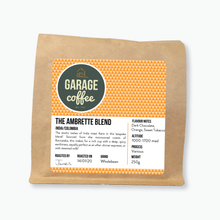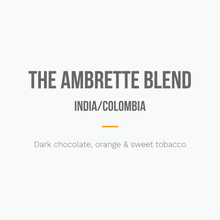Tasting Notes
Roast Level: Medium
Process: Monsooned/Washed & silo dried
Varietal: Red Catucai/Colombia
Roaster's Notes: Developed for The Ambrette, this blend makes a perfect after dinner espresso. Expect flavours of chocolate orange, with an earthy depth, that cuts beautifully with milk.
Farm Info
Producer: Bibi Plantation/Echavarria Family
Region: Karnataka State/Antioquia, Colombia
Altitude: 900 - 1700 metres
Background Information – Monsoon Malabar AA, India
Monsooned Malabar AA, from the Bibi Plantation, is a premium quality Arabica monsooned in the traditional way on the coast in Kerala and Karnataka States.
Five hours drive towards the coast from Bangalore lies the small town of Suntikoppa (population of 20,000), among the Coorg Hills of southern India. This is the heart of the coffee growing area in the state of Karnataka and all around lie small- to medium-sized farms. Located at 600-800 metres above sea level in these fertile hills is Faiz Moosakutty’s Bibi Plantation.
The 250 acre plantation has been in the Moosakutty family since 1960 and is named after Faiz’s mother. Faiz took over in 1990 and has since embarked on replanting the entire estate, aiming to create a model coffee farm. This process is now 100% complete and the Bibi Plantation produces some of the region’s finest coffee. Faiz lives on the farm with his wife, Sonia, and two children – Rihan and Tara.
Faiz does not cut corners and runs his farm in an environmentally and socially responsible way. The coffee is grown in the shade of indigenous silver oaks, jungle figs and rosewood trees, which provide habitat for a vast array of bird and insect life, and the occasional elephant from the nearby forest! While the estate is not officially certified organic, no chemical weed-killers are used; instead weeds are removed
‘Monsooning’ is a process unique to India, with a lengthy history and producing a distinctive, potent cup. It dates back to coffee farming under British colonial rule, when during the several months that it took to ship green coffee from India to Europe, the humidity and sea winds caused the beans to swell and age. As transport improved and the beans suffered less from the elements en route, European coffee-drinkers noticed that the coffee was losing the character and distinctive, bold flavour they were used to.
So, a new process was devised to replicate the conditions that produced this singular coffee.
To create a ‘monsooned’ crop, natural sun-dried green coffee is stored in open-sided warehouses on the coast, which allow moist tropical air from the monsoon winds to blow through the storage area. Over a 2 to 3-month period, the beans absorb moisture, lose a degree of their natural acidity and swell to around double their original size, becoming brittle and pale. The process starts when the monsoon season begins in June/July and is usually completed by the end of October. The result is an earthy, pungent, low acidity cup, which is often used to add body and weight to fine espresso blends.
Background Information – La Joyeria, Colombia
La Joyeria truly is ‘the jewel’ of the Estate. These lots are grown at an average altitude of 1700 meters and are 100% Colombia variety. Each lot is composed of two days worth of picking; the coffee picked on the second day is added to the first after 24 hours fermentation and then left to ferment in the tanks for a further 24 hours. In this method of fermentation, the second batch raises the ph level of the fermentation tank, permitting longer fermentation times without the acetic acid produced by bacteria at a lower ph level.
La Joyería is named for and processed at the main mill on the Santa Bárbara farm. The mill can process up to 7,000 bags of coffee; however, La Joyería makes up a very small percentage of this volume. It is also stored and milled separately from the volume production.
Santa Bárbara Estate employs 60 people all year round, who on average earn 30% above the minimum wage. Half of these also receive free housing within the farm for themselves and their families. A further 1,200 pickers are hired during the main harvest, comprised mainly of farmers from around the Santa Bárbara Estate who pick coffee to supplement their income. Workers are generally long-term employees and have been with the company for more than 10 years.
The Santa Bárbara Estate also runs an extensive scholarship and financial aid program for worker’s children as well as helping long-standing employees to acquire their own piece of land upon retirement.




